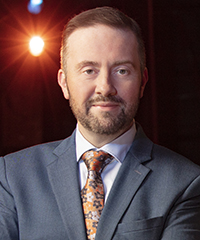Special Reports
MA Top 30 Professional: Michael Egel

General and Artistic Director
Des Moines Metro Opera
In 2013, when Michael Egel was named head of Des Moines Metro Opera, he made a promise to the board. “I told them that there would be in every season one piece, and eventually two pieces a season, that were new to the company,” says Egel, a native Iowan whose first experience with the festival was a front-of-house internship as a college student in 1993. “I’ve moved the company away from the standard 19th-century operas, and we’ve had terrific success with that. In the last three seasons, our ticket sales have reached their highest levels in 15 years.”
To dream up programming, Egel has a hobby that involves notecards with opera titles on them. “It’s like a Tetris puzzle,” he says, referring to the popular video game. “I slide the cards around together in an attempt to come up with the most fascinating combinations of pieces I can think of.” The result has been summer festivals distinguished by contrasting but surprisingly complementary works. Recent inspired pairings include Bartók’s Bluebeard’s Castle and Prokofiev’s Love for Three Oranges in 2023; Debussy’s Pelléas et Mélisande and Strauss’s Salome in 2024; and, next season, Janácek’s The Cunning Little Vixen and Stravinsky’s The Rake’s Progress.
In addition to the Debussy-Strauss duo last summer, Des Moines staged Rossini’s The Barber of Seville and the premiere of Damien Geter’s American Apollo, with libretto by Lila Palmer, about painter John Singer Sargent and his Black model Thomas Eugene McKeller. In 2022, the company’s 50th anniversary, it premiered A Thousand Acres, with music by Kristin Kuster and libretto by Mark Campbell, from Jane Smiley’s novel that transplants King Lear to an Iowa farm.
With a 2024 budget of $5.57 million, the festival presented 17 performances of four productions. They played to 94% capacity in the 467-seat theater of the Blank Performing Arts Center on the campus of Simpson College, where Egel studied vocal performance and music education. “I know some people don’t want to hear a
big work like Salome in such a small space,” he says. “But I adore the intimacy and think it makes the opera better.”





 FEATURED JOBS
FEATURED JOBS

 RENT A PHOTO
RENT A PHOTO


